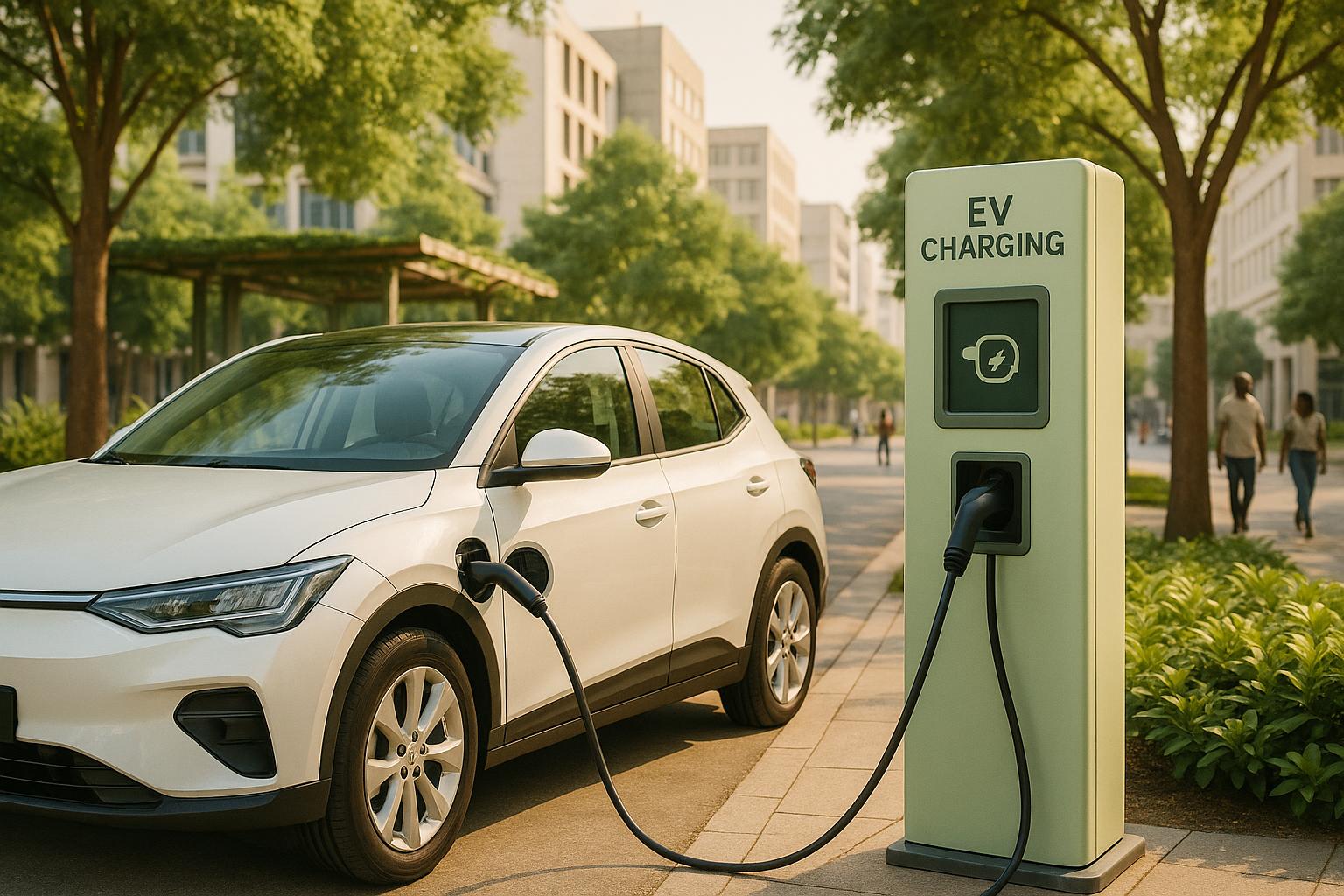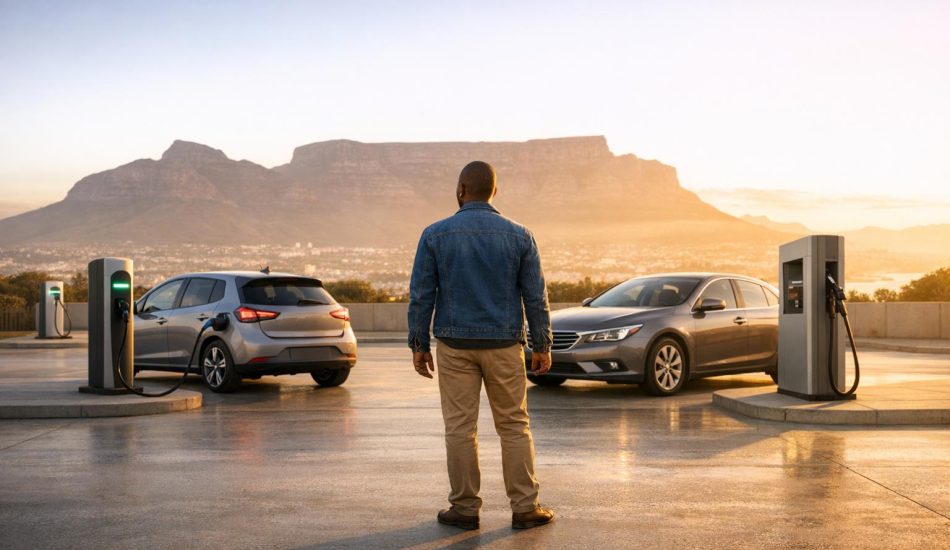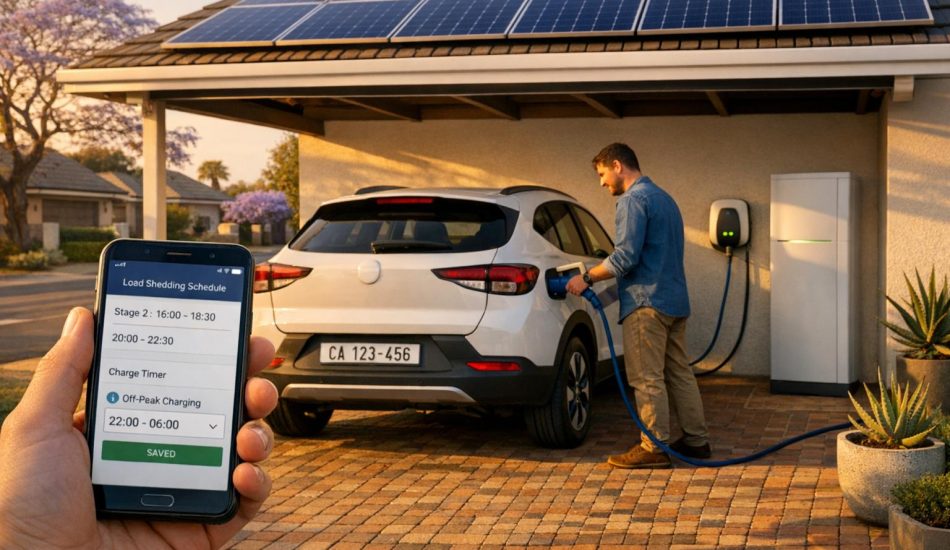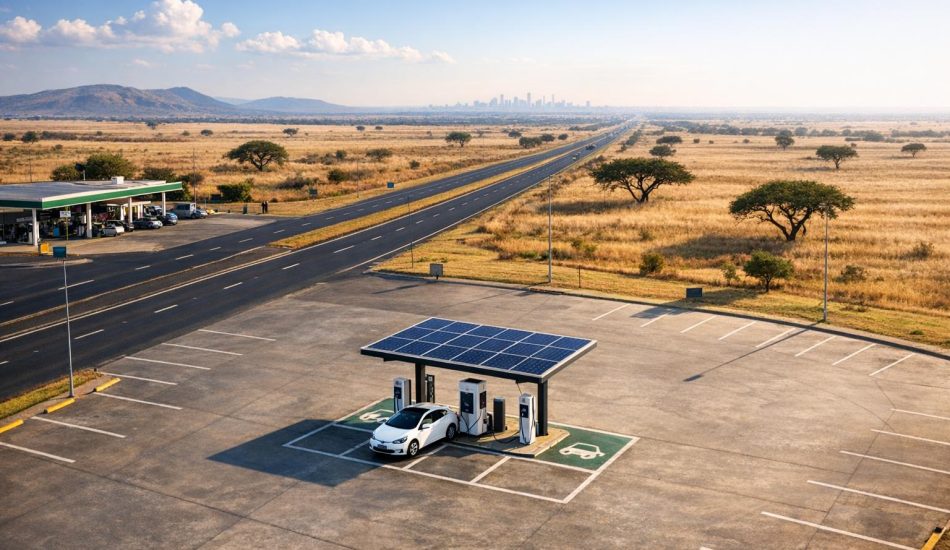
Africa is accelerating its shift toward electric vehicles (EVs) in 2025 with bold regulatory changes, incentives, and infrastructure developments. Here’s what you need to know:
- Ethiopia: Banned internal combustion engine (ICE) vehicle imports in 2024, leading to over 60% of new registrations being EVs by early 2025.
- Zimbabwe: Reduced EV import duties to 25% and introduced subsidies (20% for personal EVs, 40% for electric buses).
- South Africa: Launching a 150% investment allowance for EV and hydrogen vehicle production in 2026.
- Rwanda: Tax exemptions for EVs and charging equipment, aiming for 100% EV adoption by 2030.
- Kenya: Expanded its EV charging network with 45 new stations planned and tax exemptions for EV imports.
Challenges include low motorization rates, fragmented regulations, and limited charging infrastructure. However, investments in manufacturing, battery recycling, and second-life uses for EV batteries are growing. Projections suggest Africa’s EV fleet could exceed 25 million units by 2040, with a market value of $52.24 billion across the Middle East & Africa by 2030.
These policies are reshaping transportation, creating opportunities for businesses and consumers while addressing logistical and environmental hurdles.
SA makes headway with electric vehicle laws
Regional Policy Frameworks and Incentives
The policy landscape for electric vehicles (EVs) has evolved significantly since 2025, with regional strategies across Africa shaping the future of sustainable transportation. Each region is crafting policies tailored to its unique economic and transportation needs, creating a diverse and dynamic environment for EV adoption.
East Africa: Pioneering EV Policy Initiatives
East Africa has emerged as a leader in EV policy development, with Rwanda taking bold steps to electrify its transportation sector. In 2025, the country mandated that all new motorcycle registrations must be electric, aiming for a complete transition of its motorcycle fleet by 2030. This move directly addresses urban air quality issues in Kigali.
"Rwanda’s commitment to transitioning to electric motorcycles is a bold step towards sustainable urban mobility", says Rose Mutiso from the Energy for Growth project team.
Kenya, on the other hand, has focused on reducing financial barriers for consumers. In 2025, the country introduced tax exemptions for imported EVs and charging equipment, making electric vehicles more accessible to its population.
"Tax exemptions in Kenya are crucial for making electric vehicles a viable option for many consumers", explains Hamna Tariq from the Energy for Growth project team.
These policies not only encourage adoption but also lay the foundation for future investments in local EV manufacturing.
Southern Africa: Building on Manufacturing Strengths
Southern Africa has taken a manufacturing-driven approach to EV integration. South Africa, with its well-established automotive industry, is leveraging its infrastructure to support the production and assembly of electric vehicles and their components. This strategy capitalizes on the region’s industrial capabilities, positioning it as a manufacturing hub for EVs.
By integrating EV production into its existing automotive sector, Southern Africa aims to strengthen its role in the global EV supply chain while driving local economic growth.
West and North Africa: Balancing Adoption and Infrastructure
West and North Africa have adopted a dual approach, combining consumer-focused incentives with efforts to enhance local infrastructure. In 2025, Nigeria introduced a 50% reduction in import duties for electric vehicles, making them more affordable and accessible to consumers.
Similarly, Ghana’s Ministry of Transport launched a tax exemption program for EV imports, aligning with its broader sustainability goals.
"The transition to electric vehicles is not just about technology; it’s about creating a sustainable future for our cities and our people", emphasized Ghana’s Minister of Transport.
Meanwhile, Egypt is focusing on infrastructure development, with plans to establish charging networks along key corridors connecting North Africa to sub-Saharan markets. This positions Egypt as a logistical hub for EV distribution across the continent.
These varied regional approaches reflect differing priorities – East Africa is tackling urban pollution through rapid EV adoption, Southern Africa is leveraging its manufacturing expertise, and West and North Africa are balancing consumer incentives with infrastructure expansion. Together, these strategies present unique opportunities and challenges for businesses looking to navigate Africa’s diverse EV markets.
National Strategies and Implementation Challenges
National strategies across Africa showcase a variety of approaches to electric vehicle (EV) adoption – some countries are taking bold, decisive actions, while others face hurdles in execution. This mix of ambition and obstacles highlights both the immense potential and the complexity of transitioning to EVs. Let’s dive into specific examples to understand the strategies and challenges shaping this shift.
Ethiopia’s ICE Vehicle Import Ban
In 2023, Ethiopia made headlines by banning the import of internal combustion engine (ICE) vehicles, a move that spurred a dramatic increase in EV registrations. The number of registered EVs jumped from 4,600 in 2023 to 14,000 by early 2025. By March 2025, over 60% of new vehicle registrations were electric, signaling a rapid consumer shift when ICE options were no longer available.
"Ethiopia has taken a bold step by becoming the first country to ban the import of ICE vehicles in 2023", stated the Global Green Growth Institute.
Despite this progress, challenges remain. Across Africa, motorization rates are low – 76% of countries have fewer than 100 vehicles per 1,000 people. Additionally, unreliable power grids pose a significant challenge for supporting the growing demand for EV charging infrastructure.
Rwanda’s Gradual EV Transition
Rwanda has taken a more measured approach compared to Ethiopia’s aggressive reforms. Starting in 2023, Rwanda implemented policies like tax exemptions on EV imports and investments in charging infrastructure. This strategy led to a remarkable 396% increase in EV adoption between 2023 and 2024.
"Rwanda introduced its first EV promotion package in 2023, including tax exemptions on EV imports and charging infrastructure", according to the Global Green Growth Institute.
By focusing on affordability and infrastructure, Rwanda demonstrates how gradual, well-planned measures can encourage EV adoption while avoiding the pitfalls of abrupt policy changes.
Policy Gaps and Regional Disparities
While some countries are making strides, regulatory inconsistencies remain a significant hurdle across the continent. Only 28% of African nations have set at least one national EV target, and just 39% have enacted legally binding EV incentives. Ghana, for instance, has introduced an eight-year zero-tariff window, attracting assembly investment commitments from global manufacturers.
However, policy reversals in some nations, like Uganda, have shaken investor confidence. Uganda’s potential for EV growth is hindered by inconsistent government incentives and a lack of sustained support. Additionally, only 17% of African countries have 10 or more public charging stations. This limited infrastructure creates a vicious cycle – low EV adoption discourages investment in charging networks, which in turn slows further adoption.
"Without context-specific data and analysis, African policymakers and investors are flying blind", explains Rose Mutiso from the Energy for Growth project team.
Fragmented regulations further complicate matters. Vehicles approved in one country may fail to meet the standards of neighboring markets, making regional trade and investment more difficult. These inconsistencies highlight the need for harmonized policies that leverage regional strengths. Ethiopia and Rwanda’s early successes show that clear, consistent strategies paired with infrastructure investments can accelerate EV adoption, even in economically challenging environments.
Charging Infrastructure and Quality Standards
With updated national policies in place, the focus has shifted to two critical areas for electric vehicle (EV) adoption: building a reliable charging infrastructure and ensuring consistent vehicle quality standards. Expanding Africa’s charging network requires decisive government leadership and strong public–private partnerships. While some nations are making headway, others are still at the starting line. The challenge isn’t just about putting up charging stations – it’s about creating systems that function seamlessly across different regions and vehicle types.
Charging Networks: Building Infrastructure
Kenya is making strides in expanding its EV charging network. In May 2025, the country announced plans to establish 45 new charging stations across six counties, including key locations like Jomo Kenyatta International Airport. This initiative, supported by a KSh 258 million (~$1.8 million) investment from Kenya Power, aims to accommodate the country’s growing fleet of 9,000 EVs and encourage further adoption.
"We appreciate the immense support that we have received from the Government of Kenya towards driving the uptake of E-mobility", said Joy Brenda Masinde, Chairman of the Board of Directors at Kenya Power.
Kenya’s approach relies on public–private partnerships to share costs and ensure the financial viability of new charging stations. In Rwanda, the focus is on electric motorcycles, with around 200 charging stations now operational, supported by tax and duty exemptions. Meanwhile, South Africa leads the continent with over 300 public charging stations, thanks to networks like GridCars, which provide both slow and fast charging options. South Africa is also working on a solar-powered EV charging network, leveraging its renewable energy resources to boost infrastructure and stabilize the grid.
The cost of charging stations varies significantly, influencing deployment strategies. Fast chargers, which can cost between $50,000 and $200,000 per unit, are more expensive but offer quicker charging times. Medium chargers range from $10,000 to $50,000, while slow chargers, the most affordable option, can cost anywhere from a few hundred dollars to $10,000. Given these costs, many regions are prioritizing slower, more affordable charging solutions that can be deployed widely.
| Country | Total Public Charging Stations | Key 2025 Initiatives |
|---|---|---|
| Kenya | ~50 | 45 new charging stations planned across six counties |
| Rwanda | 200 | Financial incentives and focus on e-motorcycles |
| South Africa | 300+ | Developing a solar-powered national charging network |
As the charging infrastructure expands, ensuring uniform vehicle quality standards is equally essential for a functioning EV ecosystem.
Vehicle Quality Standards and Import Rules
While building charging networks is critical, establishing consistent quality standards for imported and used EVs is just as important. New regulations now mandate uniform safety and performance standards for imported EVs to protect consumers and ensure dependable operation.
A major step toward standardization came with the Charge Africa Memorandum of Understanding, signed in September 2024. This agreement brings together national e-mobility associations across the continent to promote uniform practices in EV infrastructure development.
"The Charge Africa MoU provides a framework for joint action in policy advocacy, research, capacity building, and project development", the organization stated.
Private companies are also stepping up. In South Africa, FedEx is working with local providers to create fleet-specific charging solutions that meet global standards while addressing local needs. Meanwhile, advancements in mobile technology are improving the user experience across charging networks. As Ben Pullen from VUKA Group observed, "The rise of mobile apps and in-car technology has made finding and accessing charging stations easier than ever."
These coordinated efforts in infrastructure development and standardization are laying a solid foundation for EV adoption across Africa, showcasing the importance of collaboration between governments and private enterprises.
sbb-itb-99e19e3
Battery Regulations and Circular Economy Programs
As Africa’s electric vehicle (EV) market expands, governments are stepping up with circular economy strategies built around Extended Producer Responsibility (EPR) frameworks. These initiatives aim to manage battery waste throughout its lifecycle, ensuring that the environmental benefits of EVs aren’t overshadowed by improper disposal practices.
This shift in regulations is essential. According to the Global Battery Alliance, stationary battery capacity in sub-Saharan Africa is expected to grow by seven to fourteen times in the next decade. This makes effective battery management not just important but urgent.
Battery Recycling Policies and Methods
Nigeria has taken a leading role in addressing battery waste with its National Environmental (Battery Control) Regulations 2024. These regulations place the responsibility for end-of-life battery management squarely on producers. The framework aligns with global standards like the Basel and Bamako Conventions and requires collaboration with Producer Responsibility Organizations to ensure safe collection and recycling.
"We are committed to supporting the necessary enforcement mechanisms to achieve the implementation and enforcement of the National Environmental (Battery Control) Regulations, 2024", said Balarabe Lawal, Nigeria’s Minister of Environment.
South Africa introduced its EPR framework for portable batteries in 2021. This requires producers to join a Producer Responsibility Organization (PRO), which funds collection and recycling initiatives. Meanwhile, Kenya implemented its Sustainable Waste Management (Extended Producer Responsibility) Regulations in 2025. These rules mandate producers to register with the National Environment Management Authority (NEMA) and achieve specific recycling targets.
| Country | Regulatory Framework | Key Requirements |
|---|---|---|
| Nigeria | National Environmental (Battery Control) Regulations 2024 | Mandatory EPR; producer responsibility for end-of-life management |
| South Africa | EPR under National Environmental Management: Waste Act | Producers must join a PRO to fund collection and recycling programs |
| Kenya | Sustainable Waste Management (EPR) Regulations 2025 | Registration with NEMA; recycling targets for producers |
Despite these efforts, formal recycling systems are still underdeveloped. A significant portion of used batteries in Africa is processed through informal channels that lack proper environmental safeguards. However, the global lithium-ion battery recycling market is on the rise, projected to grow from $16.23 billion in 2024 to $56.87 billion by 2032. This highlights the economic opportunities tied to improved recycling infrastructure.
Second-Life Uses for EV Batteries
Recycling isn’t the only solution. Repurposing EV batteries for second-life applications offers another way to maximize their value. Batteries that no longer meet automotive standards can still be used for stationary energy storage, providing a sustainable alternative.
Rwanda is leading by example. Through a partnership with Enviroserve, the country has established a state-of-the-art battery recycling facility in Kigali. This facility not only handles battery disposal but also focuses on repurposing batteries for energy storage, contributing to Rwanda’s renewable energy goals.
"Batteries are crucial to supporting Africa’s energy access goals, particularly in sub-Saharan Africa where energy infrastructure is lacking", states the Global Battery Alliance.
Similarly, Ghana and Kenya are exploring ways to use EV batteries for solar energy storage in rural areas. These efforts align with the African Union’s Agenda 2063, which emphasizes sustainable resource management and development. On a broader scale, regional organizations like the East African Community (EAC) and the Southern African Development Community (SADC) are working to create standardized EPR frameworks that encourage cross-border collaboration in recycling and repurposing.
The success of Rwanda’s public-private partnership with Enviroserve illustrates how collaboration can pave the way for effective battery management systems. By combining government policies with private sector expertise, African nations can address battery waste while supporting renewable energy initiatives.
Market Growth Projections and Future Opportunities
Africa’s electric vehicle (EV) market is on the brink of a major transformation, thanks to regulatory reforms and expanding infrastructure. As of May 2025, the continent’s EV fleet surpassed 30,000 vehicles – a pivotal moment in its shift toward electric mobility.
In 2025, the African EV market was valued at $15.94 billion, with projections indicating growth to $17.58 billion by the end of the year. This represents a compound annual growth rate (CAGR) of 10.26% through 2033. Across the broader Middle East & Africa region, the EV market is expected to reach $52.24 billion by 2030, growing at a 39.7% CAGR.
"Africa’s EV market trends prioritize high-utilization commercial segments, creating pathways for e-mobility startups to capture the continent’s massive ICE motorcycle fleet turnover every 5-10 years", says the Africa E-Mobility Alliance.
This rapid growth reflects the influence of new regulations and incentives that are accelerating EV adoption across the continent.
Adoption Trends by Region and Vehicle Type
East Africa continues to lead the way in embracing electric mobility, particularly in the two- and three-wheeler categories. Tanzania has taken the top spot in the region with approximately 10,000 electric two- and three-wheelers (E2/3W), followed by Kenya with 8,421 units and Togo with 4,000 units. This progress is largely driven by supportive policies and financial incentives that make EVs more accessible for both consumers and businesses.
The adoption of electric vehicles in Africa is growing across all segments:
- Electric two- and three-wheelers saw a 38% year-over-year increase.
- Electric four-wheelers grew by 28% year-over-year.
- The electric bus (e-bus) segment surged by 44% year-over-year.
Battery Electric Vehicles (BEVs) accounted for 62.5% of all EV sales in Africa in 2024, showcasing a clear preference for fully electric models over hybrids. Passenger cars are expected to dominate the market, making up 57.4% of total EV registrations in 2024.
The commercial vehicle segment is showing exceptional promise. For instance, Kenya’s BasiGo has rolled out 100 electric buses, which serve thousands of passengers daily, proving the feasibility of electric public transportation. Egypt leads the e-bus market with 200 units, followed by Senegal and Kenya.
Investments in Africa’s EV market are also gaining momentum. The Africa E-Mobility Alliance reports that over $100 million has been invested per region. Notable projects include BasiGo’s $42 million investment to deploy 1,000 electric buses in Kenya and Rwanda.
2030 Market Outlook
Looking ahead, Africa’s EV market is set to expand even further, building on the regulatory and infrastructure advancements of 2025. By 2030, projections suggest that 4% to 8% of vehicles in circulation in key countries like Ethiopia, Kenya, Nigeria, Rwanda, and Uganda will be electric. By 2040, this figure could rise to 25-35%.
Africa’s relatively low motorization rate – 43 vehicles per 1,000 people – and its heavy reliance on public transportation (60-80% of urban trips) make the region well-suited for EV adoption.
Manufacturing is also picking up pace. In June 2023, the Renault-Nissan Alliance began assembling the Dacia Spring EV at its Tangier plant in Morocco. Priced under $20,000, it’s the most affordable electric car in the region. Similarly, in March 2023, Mobius Motors launched the EV2, a rugged electric pickup truck designed for off-grid use in rural Kenya, targeting smallholder farmers and logistics providers.
Cost savings are another key driver. In Kenya, driving 100 kilometers in an EV costs 47-83% less than using an internal combustion engine (ICE) vehicle. Combined with fiscal incentives like Rwanda’s 0% duties on EVs and Ethiopia’s duty-free CKD kits, these factors are making EVs increasingly appealing.
However, challenges persist. The average cost of a new EV in Africa is around $55,600, which is 30% higher than traditional vehicles. This price gap highlights the need for local production and targeted incentives to improve affordability.
The integration of renewable energy with EV charging infrastructure offers additional opportunities. For example, Nigeria’s Lagos Island Solar Initiative is a step toward creating a sustainable ecosystem that combines energy access goals with transportation electrification.
For businesses and investors, the commercial EV segment presents the most immediate potential. High usage rates for commercial vehicles, combined with government support and expanding charging networks, make this sector particularly attractive. Urban areas with established public transport systems are especially promising for electric bus and ride-hailing applications.
Conclusion: Managing Africa’s EV Regulations in 2025
Africa’s evolving EV regulations in 2025 are opening up new possibilities for businesses and consumers alike. From South Africa’s 150% tax deduction for EV manufacturers to Nigeria’s $100 million investment in electric buses and tricycles, these changes highlight a growing commitment to electric mobility across the continent.
One major development this year is the launch of the Africa EV Readiness and Impact Index, which provides tailored insights for stakeholders navigating this shifting landscape. As Rose Mutiso from Energy for Growth aptly puts it:
"Without context-specific data and analysis, African policymakers and investors are flying blind".
This underscores the importance of aligning strategies with the latest regulatory shifts.
For manufacturers and investors, staying informed is key to tapping into the opportunities these changes present. South Africa’s $54.2 million investment in local EV production, announced in early 2025, offers fertile ground for companies aiming to establish a foothold in the region. Similarly, Nigeria’s Federal Executive Council’s recent approval of electric vehicle deployment contracts signals significant growth potential in the commercial EV sector.
Consumers, too, stand to gain as these policies aim to enhance access to electric vehicles and charging infrastructure, making the transition to electric mobility more feasible across the continent.
As discussed earlier, the diverse and rapidly changing EV policies across African nations demand active participation from all stakeholders. Energy analyst Matthew Goosen of Energy Capital & Power highlights this point:
"The introduction of tax incentives and investment in infrastructure is crucial for the growth of the EV market in Africa."
His perspective reinforces the need for businesses, investors, and policymakers to engage actively with these developments rather than adopting a wait-and-see approach.
To succeed in Africa’s dynamic EV market, stakeholders must remain proactive. Tools like the Africa EV Readiness and Impact Index can provide valuable guidance, while collaboration with local governments and adaptability to regulatory changes will be critical. The 2025 reforms position Africa as a key player in the global shift toward electric mobility, and staying ahead of these changes will be essential for those looking to thrive in this emerging market.
FAQs
How are African countries tackling the challenges of limited EV charging stations and low vehicle ownership rates?
African countries are tackling the challenges of limited EV charging infrastructure and low vehicle ownership in creative and focused ways. Governments are rolling out incentives such as tax reductions and subsidies to encourage private companies to invest in charging networks. At the same time, partnerships with international organizations are helping fund large-scale infrastructure projects. Some nations are even turning to renewable energy solutions, like solar-powered charging stations, to address electricity access issues, particularly in rural regions.
To make EVs more appealing despite low car ownership, several countries are prioritizing affordable electric vehicle options and promoting shared mobility services, including electric buses and taxis. These strategies aim to make EVs accessible to more people while supporting urban development that’s both efficient and environmentally friendly. By tackling these hurdles head-on, African nations are paving the way for businesses and communities to embrace the growing EV market.
What new incentives and regulations are encouraging local EV manufacturing in Africa?
South Africa has announced a 150% tax deduction for investments in electric and hydrogen-powered vehicle production, set to take effect on March 1, 2026. The goal? To draw significant investments into the electric vehicle (EV) sector and its associated technologies.
Beyond tax incentives, the government is also offering financial support to ramp up local production of EVs and batteries. These measures aim to position Africa as a key player in the global EV market, while opening doors for businesses and encouraging technological advancements in the region.
What steps are African countries taking to address EV battery waste and encourage sustainable recycling?
African countries are stepping up to tackle the challenges of EV battery disposal by introducing a range of policies. Efforts include establishing recycling programs to reclaim materials like lithium and cobalt, implementing regulations to ensure batteries are disposed of safely, and urging manufacturers to focus on recyclable designs that are kinder to the planet.
Governments are also providing incentives to businesses that invest in sustainable recycling technologies and infrastructure. These measures not only aim to minimize environmental damage but also open doors for local industries to grow within the expanding EV market.




